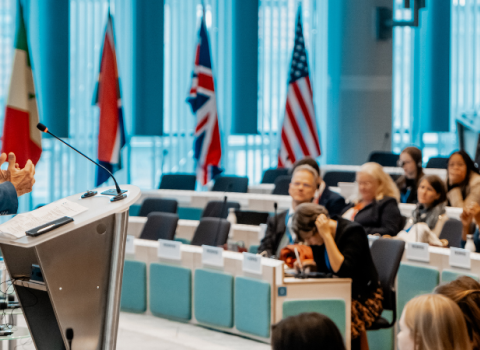On 21-22 November, members of the European University Association’s Expert Group on Science 2.0/Open Science (EGOS) met in Braga, Portugal, and online for the final meeting of the group in its current composition.
During the meeting, EGOS members discussed EUA activities and provided updates from national level concerning the three priority areas of the EUA Open Science Agenda 2025: Open Access, FAIR research data and research assessment. The meeting was also an opportunity to mark the end of the current Expert Group, which will welcome new members in 2023, celebrate its many achievements and reflect on lessons learnt from the first seven years of activity.
First established in 2015, EGOS drives EUA’s work on Open Science, providing recommendations and guidance to support the EUA Secretariat in the definition of the Association’s position and activities in the field.
Looking back at the first meeting of EGOS in September 2015, Jean-Pierre Finance, Chair of the Expert Group and Professor Emeritus at the University of Lorraine, reflected on the strengths and impact of the group. Over the years, EGOS has been instrumental in supporting EUA as it navigates the ever-evolving landscape of Open Science, addressing topics such as Open Access, Open Data, Text and Data Mining, copyright legislation and scholarly publishing. It has done so by proposing recommendations, fostering exchange among different institutional and national contexts and providing input to more than 20 publications produced since 2015. This includes four EUA survey reports on Open Science, which over the years provided the research community with evidence-based recommendations on how to advance Open Science at institutional level.
Reflecting on lessons learnt and recommendations for their successors, current members recognised diversity, stability and trust-based relationships as key strengths of the group. Over the years, EGOS has been timely in identifying strategic priorities and proposing concrete recommendations. The results of these efforts are visible at institutional level, where many universities have benefited from the evidence-based work, thus adapting their policies and practices. This impact can also be seen at national level, where EGOS’ work has informed the push for the reforms needed to support the transition to Open Science. New EGOS members will now be tasked with bringing forward these developments, as well as identifying new challenges, threats and opportunities for universities in the field of Open Science.
EUA was also pleased to welcome Lidia Borrell-Damián, Secretary General of Science Europe to the first session of the meeting. In her former role as EUA Director of Research and Innovation, Lidia was among the initiators of EGOS, together with former EUA Board members Jean-Pierre Finance and Sijbolt Noorda, as well as Bernard Rentier. During the meeting, she expressed her thanks to Jean-Pierre Finance for steering the group and acknowledged the key role of EGOS. In particular, Lidia welcomed the two associations’ close collaboration in the context of the initiative to reform research assessment and expressed her wish for a continued and fruitful partnership in jointly advocating for the opening up of the research process.
For the first time, the meeting was hosted by a EUA member institution, the University of Minho. In his welcome address, Eugénio Campos Ferriera, Vice-Rector for Research, recognised the valuable work that the group has developed over the years in supporting universities towards the transition to Open Science. He highlighted how the University of Minho is at the forefront of Open Science in Portugal, through its work on supporting Open Access to publications and through the promotion of research data repositories to publish and share research data.
The first meeting of the new EGOS will take place in spring 2023. The new group will drive the implementation of the EUA Open Science Agenda 2025 and continue to guide EUA’s Open Science advocacy and activities, in close collaboration with the newly appointed EUA Research and Innovation Strategy Group (RISG).
This article was first published on 8 December by EUA.





 A unique international forum for public research organisations and companies to connect their external engagement with strategic interests around their R&D system.
A unique international forum for public research organisations and companies to connect their external engagement with strategic interests around their R&D system.